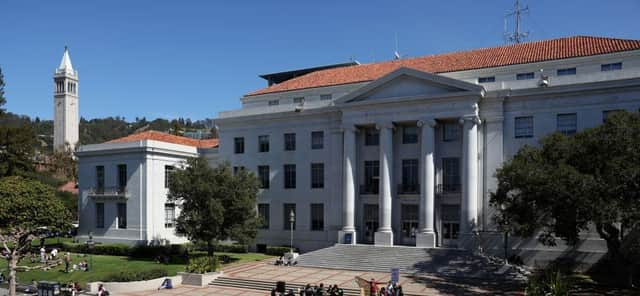An Irish university’s decision to rename its library to remove slave heritage has knock-on effect in the US


It may not be the most famous building bearing his name, but it is, right now, one of the most talked about.
This week, Irish university Trinity College announced it is to change the name of its main library, the Berkeley, after a lengthy investigation of historical records concluded that George Berkeley, the philosopher after whom it was named, had purchased several enslaved people for a plantation he owned in the US.
Advertisement
Hide AdAdvertisement
Hide AdOf course, the library is the tip of the iceberg when it comes to buildings – or indeed, whole areas - named after Anglo-Irish academic and bishop, Berkeley, who moved to America later in life.
Arguably the most well-known is top US academic institution, the University of California, Berkeley, most often known simply as Berkeley, which is situated in a city also bearing his name.
A year ago, independent news website Berkeleyside actually argued that the entire town should be renamed, due to Berkeley’s role as a slave-owning plantation owner – as well as his plans to force Native American children into Christianity, which never came to fruition.
Berkeleyside pointed to a decision by another University of California college, Hastings College of the Law, which was renamed following an article in the New York Times that examined how Serranus Hastings, the school’s namesake, played a significant role in the genocide of indigenous people in Northern California during the Gold Rush; as well as the removal of the name “Le Conte” from a Berkeley primary school and university building, due to the academic brothers after which they were named being slave owners and “outspoken racists and white supremacists”.
"As many of you perhaps are not aware, the city of Berkeley’s namesake, Bishop George Berkeley, was a slave owner, racist, and colonialist,” the website wrote in an editorial in January 2022. “As with the names Le Conte, Washington, Jefferson, Boalt, Barrows, and Krober, there are ample reasons to remove the name “Berkeley” from our city. Plainly said, it’s time to rename the city.”
So far, no steps appear to have been taken towards renaming Berkeley as a city – or as a university.
Following Trinity College’s decision to rename the Berkeley library, however, the University of California acknowledged its namesake’s misdemeanours, saying Berkeley’s views “warrant no honour or commemoration.”
“At the same time, we are cognisant of the fact that over the course of the ensuing 155 years since the university’s founding, ‘Berkeley’ has come to embody and represent very different values and perspectives,” university spokesperson Dan Mogulof said.
Advertisement
Hide AdAdvertisement
Hide AdThe debate is the same which has raged in Scotland over the likes of Henry Dundas, who had undeniable links to the slave trade, albeit arguably very different to those of Berkeley. Two years ago, a Canadian review of Dundas’ legacy concluded that he perpetuated the slave trade, due to his role in delaying the abolition of the slave trade in the 1790s.
City councillors voted to rename Toronto’s main thoroughfares – named after Dundas – and a list of potential new names is set to go before the council later this year.
It will be interesting to see what both they – and Trinity College - choose as replacements for the ousted slave trade-linked monikers.
Comments
Want to join the conversation? Please or to comment on this article.
